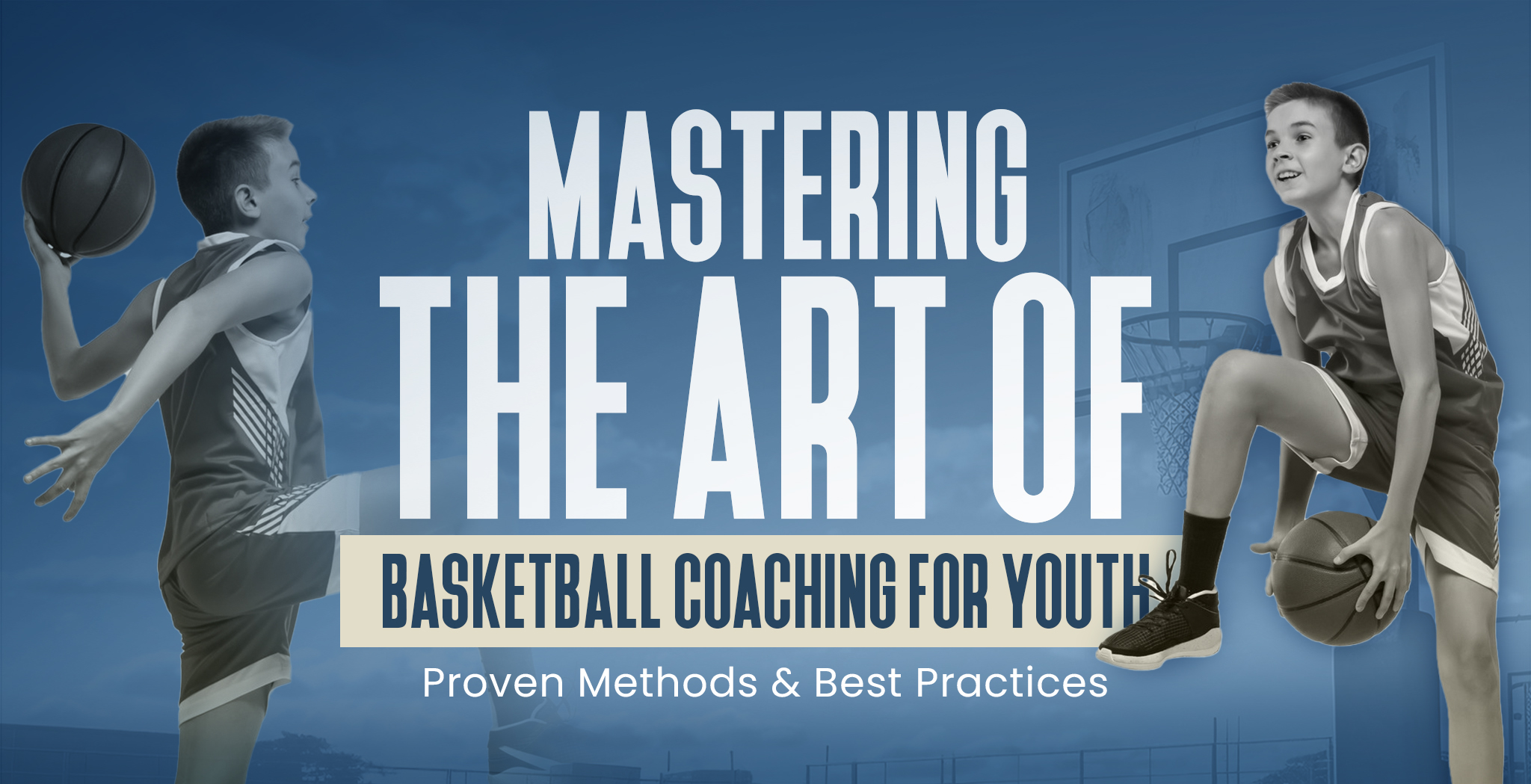Picture this: the buzzer sounds, the crowd roars, and you're on the court, ready to…

Imagine this: You’re on the sidelines, the cheers of the crowd echoing in your ears. Your young team, a mix of nervous energy and determination, huddles around you. They look to you for guidance, for the knowledge and passion that will help them conquer the court. Are you ready to be their coach, their mentor, their guide? Coaching youth basketball isn’t just about teaching the game; it’s about shaping young minds and fostering a lifelong love of sportsmanship and teamwork. This blog is your toolkit, equipping you with the proven methods and best practices to become a master youth basketball coach.
The Importance of Youth Basketball Coaching
Youth basketball coaching goes far beyond teaching layups and free throws. It’s about planting the seeds of positive values, teamwork, and a love for sports that can blossom throughout a child’s life. Coaches play a crucial role in:
- Building confidence and self-esteem: Encouragement and positive reinforcement from coaches can empower young players to believe in themselves and their abilities.
- Instilling valuable life lessons: Sportsmanship, teamwork, and perseverance are crucial lessons learned on the court that translate effectively into other aspects of life.
- Creating a positive and healthy environment: Youth basketball can provide a safe space for physical activity, social interaction, and fostering a sense of belonging.
- Identifying and nurturing talent: Coaches can play a pivotal role in identifying potential and fostering the development of talented young players.
By dedicating their time and energy, youth basketball coaches significantly impact the lives of young players both on and off the court.
Core Coaching Principles: The Foundation for Success
Before diving into specific drills and strategies, it’s crucial to first establish a solid foundation built upon core coaching principles. These principles serve as the guiding light for your journey as a youth basketball coach, ensuring that your players not only develop their skills but also thrive in a positive and nurturing environment. Let’s delve into a few of these essential principles:
Focus on Fun and Development:
- Create a Positive and Enjoyable Learning Environment: Laughter, cheers, and a sense of belonging are crucial ingredients for a successful youth basketball program. Design practices and activities that are engaging, age-appropriate, and promote a sense of fun.
- Prioritize Skill Development over Winning Games: The focus at this age should be on teaching fundamental skills like dribbling, passing, shooting, and teamwork. Winning comes later, and prioritizing skill development equips players with the tools they need to succeed both on and off the court.
Positive Communication and Encouragement:
- Embrace the Power of Positive Reinforcement: Celebrate effort, hustle, and teamwork. Positive reinforcement builds confidence, motivates players to learn and improve, and fosters a positive learning environment.
- Constructive Criticism: While positive reinforcement is essential, constructive criticism is equally important. Offer clear, specific feedback focused on improvement, not punishment. Help players understand their mistakes and provide the guidance they need to learn and grow.
Building Teamwork and Sportsmanship:
- Instill the Values of Teamwork and Cooperation: Emphasize the importance of working together towards a common goal. Create drills and activities that encourage players to communicate, cooperate, and support each other.
- Teach Good Sportsmanship and Fair Play: Foster a culture of respect and fair play. Teach players to win with humility and lose with grace. Emphasize the importance of shaking hands with opponents and officials, demonstrating respect for the game and everyone involved.
By embracing these core principles, you can create a positive and rewarding experience for your young players. Remember, winning games is secondary; your primary goal is to nurture their love for the game, foster their development, and instill valuable life lessons.
Proven Coaching Methods: Equipping Your Players for Success
Now that you’ve established a strong foundation based on core coaching principles, let’s explore some proven methods that will equip your players with the skills and knowledge they need to excel on the court:
- Practice Planning and Drills:
- Creating Age-Appropriate Practice Plans: Structure your practices with clear objectives tailored to your players’ age and skill level. Ensure a balance between individual skill development, teamwork drills, and scrimmage time.
- Engaging Drills for Fundamental Skills: Move away from monotonous drills and incorporate creative activities that are fun and challenging. This can include incorporating games, competitions, or station-based learning into your practice sessions.
- Game Strategies and Adjustments:
- Introducing Basic Game Concepts: Gradually introduce your players to basic game concepts like offensive sets, defensive strategies, and transition plays. Break these concepts into manageable steps, ensuring clear understanding before moving on.
- Adapting and Making Adjustments: The game is a dynamic environment. Teach your players to read the situation and adapt their play accordingly. Encourage communication and encourage them to ask questions and make suggestions during timeouts or huddles.
- Individualized Attention:
- Identifying Strengths and Weaknesses: Take the time to understand each player’s strengths and weaknesses. This allows you to tailor your coaching approach and provide specific feedback that addresses their unique needs.
- Personalized Guidance and Feedback: Don’t underestimate the power of one-on-one coaching. Offer personalized guidance and constructive feedback to each player, addressing their challenges and helping them improve their skills.
Remember, effective coaching is not a one-size-fits-all approach. By combining these proven methods, you can create a dynamic and engaging learning experience for your players, fostering their development and preparing them for success both on and off the court.
Best Practices for Youth Basketball Coaches: Elevating Your Game
Beyond the core principles and proven methods, becoming a truly effective youth basketball coach requires embracing certain best practices. These practices will ensure you approach coaching with professionalism and dedication, fostering a positive environment for your players and setting them up for success:
-
Stay Organized and Prepared:
- Planning is Key: Plan your practices and games effectively. Create clear agendas for practices with specific drills and objectives. Have a game plan for each opponent, outlining offensive and defensive strategies.
- Maintain a Positive and Professional Demeanor: Project confidence and enthusiasm. Be organized and punctual, demonstrating professionalism both on and off the court.
-
Effective Communication with Parents and Players:
- Open Communication: Maintain open communication channels with both players and their parents. Address concerns promptly and address issues respectfully. Regularly update parents on their child’s progress and upcoming events.
- Actively Listen: Encourage open dialogue with players. Actively listen to their concerns, questions, and suggestions. Provide clear and concise answers, fostering a sense of trust and respect.
-
Continuing Education and Development:
- Never Stop Learning: Seek opportunities to continuously learn and improve your coaching skills. Attend coaching clinics and workshops, watch professional basketball games, and explore online resources.
- Embrace New Techniques: Be open to learning and implementing new coaching techniques and strategies. Network with other coaches, share best practices and create a community of continuous learning.
By incorporating these best practices, you not only enhance your coaching abilities but also demonstrate your dedication to your players’ development. Ultimately, your passion, organization, and commitment to continuous learning will create a positive and rewarding experience for both you and your young athletes.
Coaching youth basketball is not just about teaching the game; it’s about shaping young minds and fostering a lifelong love of sportsmanship and teamwork. By embracing the core coaching principles, implementing proven methods, and adhering to best practices, you can embark on this rewarding journey with confidence and purpose.
Remember, every child steps onto the court with a unique set of talents and aspirations. Your role, as their coach, is to guide them, inspire them, and equip them with the skills and values they need to succeed, both on and off the court. So, lace up your coaching shoes, step onto the court, and make a positive impact on the lives of your young players. The future of basketball, after all, lies in the hands of dedicated coaches like you.


